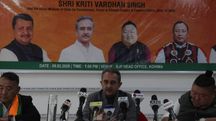Invisible threat: Why young adults are facing unexpected heart attacks
Young hearts under pressure: Lifestyle, not age, is the real threat.

Once thought to be an affliction of the elderly, heart attacks are now barging in the lives of young adults, unannounced and unforgiving. In a world racing ahead at breakneck speed, where work stress and unhealthy lifestyles blur the line between routine and risk, young hearts are facing a silent rebellion. From late-nights take outs to skipped workouts and round-the-clock screen time, the warning signs go unnoticed, until its too late.
Many young survivors never see it coming, like Raman (name changed), a 30-year-old who suffered two heart attacks in a row. He opined, "I did not feel anything. I had no warning signs, no reason to believe I was about to have a heart attack. It was a normal day until I suddenly felt unusual breathing patterns and intense pressure on my heart. Facing heart attacks at such a young age has been a tough journey. The shock was as deep as the pain. Even now, I worry about a relapse, but my strong determination has helped me push through these challenges." Raman’s story is no longer rare, it’s becoming alarmingly common especially in 2025.
Medical perspective
Heart attacks among the young adults are no longer rare medical anomalies. They are fast becoming a consequence of modern lifestyle choices combined with genetic inclinations. Often most victims dismiss initial signs such as burning chest and breathlessness are mistaken for indigestion or muscle cramps, which delays life-saving care and worsens the damage. Dr. Srikanth Shetty, a cardiologist, said, "Young people think heart attacks cannot happen to them, so they ignore symptoms. But delayed treatment leads to more heart muscle loss and higher risk."
Poor diet, smoking, frequent alcohol intake, and lack of exercise are key causes. Abdominal obesity raises risks like high blood pressure, cholesterol, and diabetes. Stress and excessive screen time make things worse. While family history plays a role, it’s the lifestyle choices that often make or break heart health. “Age is no barrier to heart attacks. If you have any symptoms, get an ECG immediately, added Shetty.” A misplaced sense of fearlessness keeps many from taking these red flags seriously, until it’s too late.
Impact of stress and mental health
The sharp rise in heart attacks among young adults has strong roots in chronic stress from relentless work schedules and unstable finances to personal challenges. Mental pressure often leads to poor coping habits such as comfort eating, chain-smoking or binge drinking creating a downward spiral that puts the heart under siege.
Over time, the combination of stress, anxiety, and unhealthy coping mechanisms can create a dangerous cycle, ultimately contributing to the growing trend of heart attacks among the younger population. Young adults must prioritise their mental wellness front and center, adopt healthier lifestyles, and sustainable ways of coping before stress translates into an emergency room visit.
Role of unhealthy diet and sedentary lifestyle
A poor diet and lack of movement are two sides of the same dangerous coin. Highly processed foods and junk meals spark chronic inflammation, paving the way for serious cardiovascular risks. In today’s fast-paced world, online food delivery and overbooked schedules leave little room for mindful eating or exercise.
Dr. Nidhi Nigam, a nutritionist, explains, "Processed foods, junk food in your diet, poor sleep, sedentary lifestyles- all play a crucial role in increasing the risk of heart diseases." She added “Sugar, processed food, and refined food are addictive. They play a crucial role in causing heart diseases.”
Even those who appear fit may carry hidden fat around their organs, leading to internal inflammation. Quick- fix meals and sugar- laced treats might save time but they’re costing years off young lives.
Hidden dangers
Far too often, young adults ignore warning signs of heart diseases, mistaking symptoms like chest pain and shortness of breath for minor issues like acidity or muscle strain, leading to delaying treatment and increasing complications, as heart attacks require immediate treatment to prevent heart muscle loss.
Dr. Shetty focused on the need for regular health checkups, stating, "Silent killers like high cholesterol, blood pressure, and sugar cause long-term damage without showing immediate symptoms, so early detection is key."
These conditions operate under the radar for years. But regular health screenings, early lifestyle changes and awareness can turn the tide.
Conclusion: A heart-to-heart takeaway
This isn’t just a health issue, it’s a cultural one. The rising number of heart attacks among the youth is a loud and clear signal: the way we are living is costing us our health.
Heart attacks do not check your birth certificate before striking, they check your habits. From endless scrolling to sleepless nights, skipped meals to unmanaged emotions, every little choice adds up and before you know it, your body sends a loud, painful reminder to slow down.
The message is urgent - listen to your heart before it forces you to.
Copyright©2026 Living Media India Limited. For reprint rights: Syndications Today









